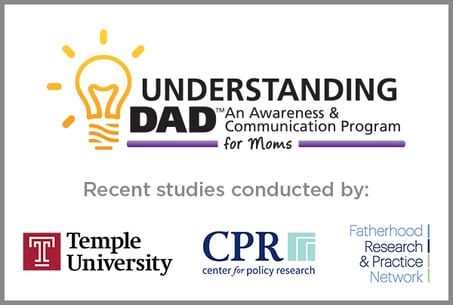Second Evaluation of Understanding Dad™ Further Reveals the Program’s Promise
3 min read
Date Published: 10/24/2019
Last Updated: 10/24/2019
National Fatherhood Initiative Blog / Latest Articles
3 min read

A second, more robust evaluation by Temple University (Philadelphia, PA) of the Understanding Dad™ program reveals its positive impact on moms’ confidence in their ability to co-parent and a reduction in conflict between moms and dads.
National Fatherhood Initiative® launched Understanding Dad™ in 2013 based on research that showed when an intervention seeks to reduce maternal gatekeeping behavior at the same time that dads participate in a fatherhood program, it increases dads’ involvement in their children’s lives above and beyond when an intervention includes only a fatherhood program.
Evaluation of Pilot
Understanding Dad™ seeks to raise moms’ awareness of the importance of dads to children’s well-being and improve moms’ communication skills. As such, it seeks to improve the co-parenting relationship and reduce conflict between parents. Specifically, it helps a mom:
Temple University conducted an evaluation of the pilot for the program in 2013. That evaluation involved 34 moms who participated in the program in one of two sites. It revealed that the program had a significant impact on moms’ relationship awareness (e.g. causes of communication problems between a mom and dad), knowledge of healthy co-parenting relationships and relationship self-efficacy (e.g. ability to let go of problems beyond a mom’s control).
Second Evaluation
Temple researchers conducted this second evaluation in partnership with researchers at the Center for Policy Research (Denver, CO) with funding provided by the Fatherhood Research and Practice Network (FRPN). This evaluation included 105 moms who participated in the program across six sites, with each site in a different state (CA, CO, NJ, NY, PA, and SC). It also involved 73 dads to measure their perception of the program’s impact on their relationship with their child’s mom. The mothers of these dads’ children participated in the program.
Using data collected before moms started to participate in the program (pre-program) and immediately after they participated in it (post-program), the researchers found that moms experienced statistically significant increases in their confidence in co-parenting and a reduction in disagreements with their child’s dad (i.e. less conflict). They also found that dads experienced a statistically significant reduction in undermining by mom of dad’s relationship with their child (i.e. reduced maternal gatekeeping).
In addition to the comparison of pre-program and post-program data, the researchers collected data three months after moms completed the program.* Not only did they find that the three pre-post outcomes held over time, they found that moms also experienced a statistically significant reduction in undermining by dad of mom’s relationship with their child.
Wait, There’s More
Not only did this evaluation explore the efficacy of Understanding Dad™, it also explored the larger issue of moms’ interest in participating in a co-parenting intervention generally and the types of moms who were most interested in participating. Therefore, the following findings have implications for the recruitment of moms into any co-parenting intervention, not just one that uses Understanding Dad™.
The researchers found that moms were most interested in participating when:
Another interesting predictor of moms’ interest was dad’s education. The more educated the dad, the more interested moms were in participating.
The researchers presented their findings in September during a webinar held by FRPN. For more details on the findings on this evaluation, click here to download a copy of the slide deck for the webinar. You can also view a recording of the 1.5-hour webinar. The research team’s slides start with #57 in the slide deck. (The webinar also included presentations by other research teams that conducted co-parenting interventions funded by FRPN.) The research team plans to submit a paper on the evaluation to a peer-reviewed journal. We will post that paper on our website as soon as it’s available and pending permission to do so.
Do the dads you serve experience gatekeeping behavior by the moms of the dads’ children?
Did you know how valuable adding Understanding Dad™ to your offerings could be to increasing father involvement and improving co-parenting?
*Fewer moms and dads provided data at follow-up than pre-post: 81 vs. 105 moms and 56 vs. 73 dads
Date Published: 10/24/2019
Last Updated: 10/24/2019
Download the ebook to learn how to create fatherhood initiatives that engage every sector of community life.

Train Your Staff
Fatherhood Programs
Fatherhood Data
© 2025 National Fatherhood Initiative®. All rights reserved.